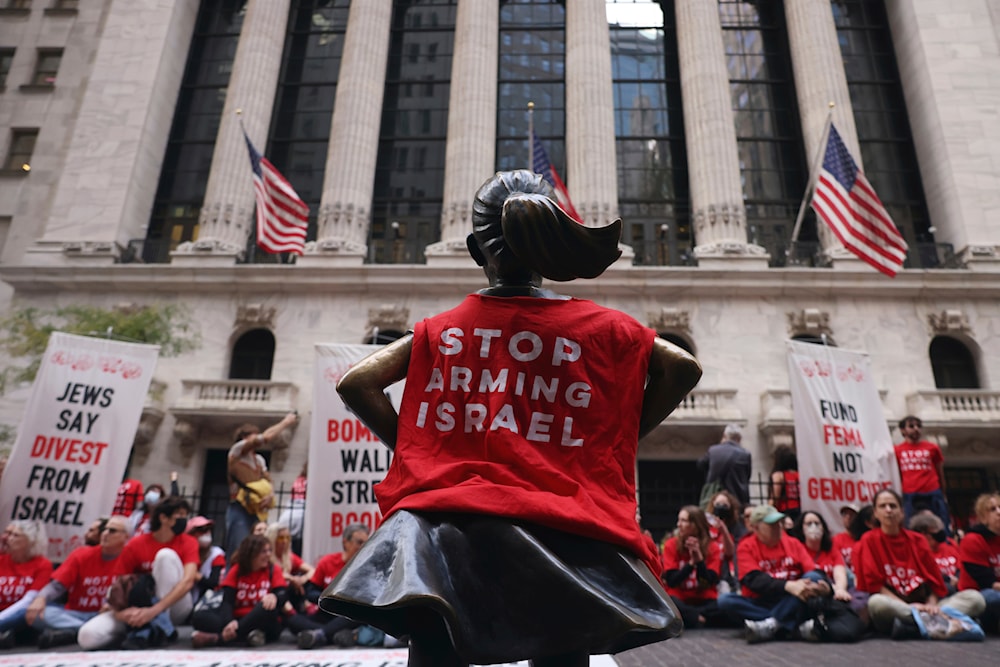Fear growing in 'Israel' over global backlash: Israeli media
Israeli decision-makers are facing growing internal and external pressure to reassess the ongoing war on Gaza as international calls for a ceasefire intensify.
-

The Fearless Girl statue wears a pro-Palestinian shirt as protesters sit in front of the New York Stock Exchange, Monday, Oct. 14, 2024, New York. (AP)
After more than 600 days of war on Gaza, the Israeli government persists in its declared objective to “break Hamas” and recover the remaining 58 captives. However, Israeli media, including newspaper Maariv, report that decision-making circles in Tel Aviv are increasingly recognizing that the “eternal war” is no longer sustainable.
The report notes that, amid the current political climate within "Israel", “there are pressing issues that necessitate a reassessment of how the war is being managed,” adding that “the time for combat is running out.” Within “Israel,” key questions are now being raised: How much longer can this war continue? And what strategy will the government pursue to navigate mounting domestic and international pressure?
Maariv underscored a growing “genuine fear” within "Israel" that the worsening scenes of famine and chaos in Gaza could ignite a global uprising against Tel Aviv, especially as international outrage mounts and calls for an end to the war gain momentum.
Several Western governments, among them Germany, the UK, France, and Spain, have begun openly calling for an immediate halt to the war. Some are even considering sanctions against “Israel” in response to the humanitarian catastrophe unfolding in the Gaza Strip.
For now, Tel Aviv continues to rely on unwavering political cover and military support from the US administration. Maariv described this backing as “the central shield protecting Tel Aviv.” However, it warned that this support is not guaranteed to last.
Trump’s stance: unpredictable and subject to change
While US President Donald Trump currently endorses the continuation of the war on Gaza, Maariv cautioned that his position could shift without warning. “Trump’s current approval of continued fighting does not necessarily mean he won’t wake up tomorrow with an opposing stance,” the newspaper stated, pointing to the unpredictability of US political dynamics.
According to the report, the worsening humanitarian disaster in Gaza and the resulting chaos have now reached a point where they “pose a direct threat to the lives of Israeli soldiers deployed there.” This has only intensified pressure on “Israel’s” political and security leadership to find a swift and viable resolution.
In a related context, families of Israeli captives held in Gaza have lately voiced alarm during a weekly press conference over ongoing negotiations that could result in a partial captive release, warning that such a deal could endanger those not included.
Einav Zangauker, whose son Matan is among those being held, revealed that she recently learned he had narrowly survived multiple airstrikes by the Israeli army. In one instance, she said, he nearly suffocated from toxic gases in a collapsed tunnel.
"Matan miraculously escaped bombings several times," she said, adding, "In one case, he almost suffocated to death from toxic gases in a tunnel that was bombed and collapsed."
Zangauker criticized Israeli Prime Minister Benjamin Netanyahu for pursuing what she described as a partial deal, warning it would amount to a "death sentence for hostages that remain behind."
Families demanded a comprehensive deal that would secure the release of all captives, criticizing what they described as political calculations taking precedence over human lives. The concerns come as Washington’s special envoy, Steve Witkoff, continues to mediate a ceasefire and prisoner exchange deal between "Israel" and the Palestinian Resistance in Gaza.
While some Israeli officials are reportedly backing a phased release, captive families fear that such an approach could prolong the suffering of those still in captivity and reduce international pressure for a full agreement.
Read next: 'Israel' killed tens of its own captives in war on Gaza: NYT

 4 Min Read
4 Min Read








